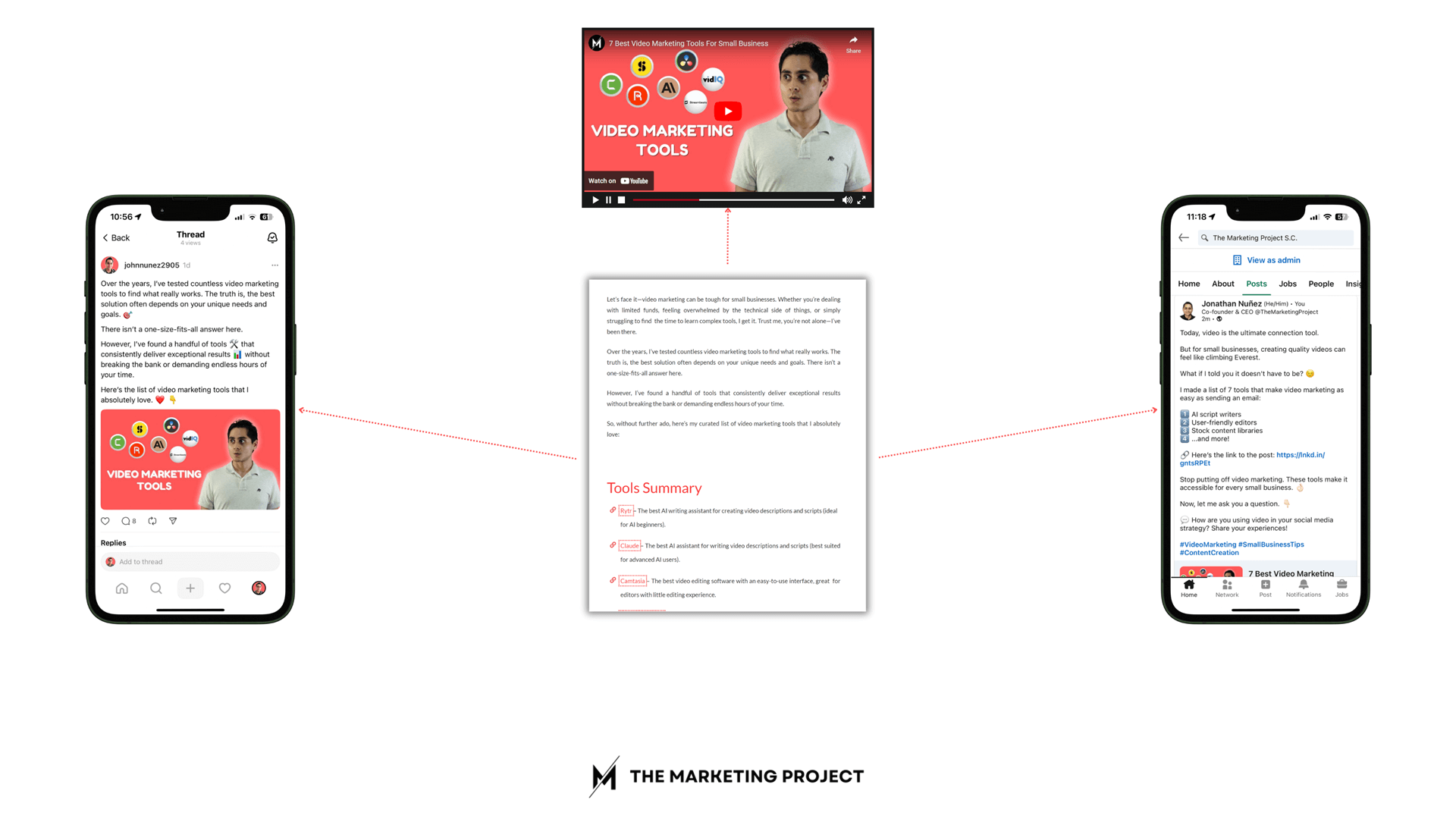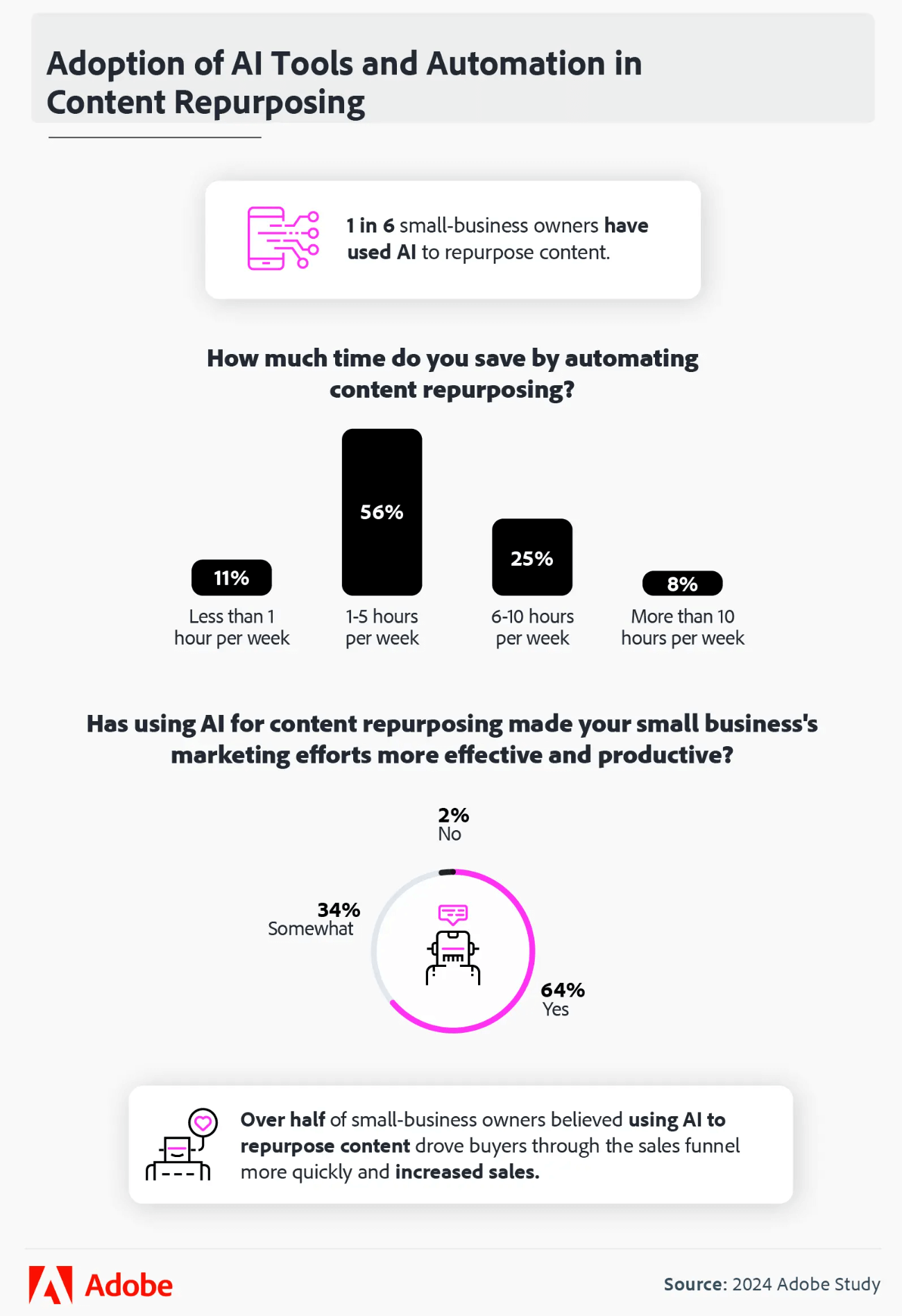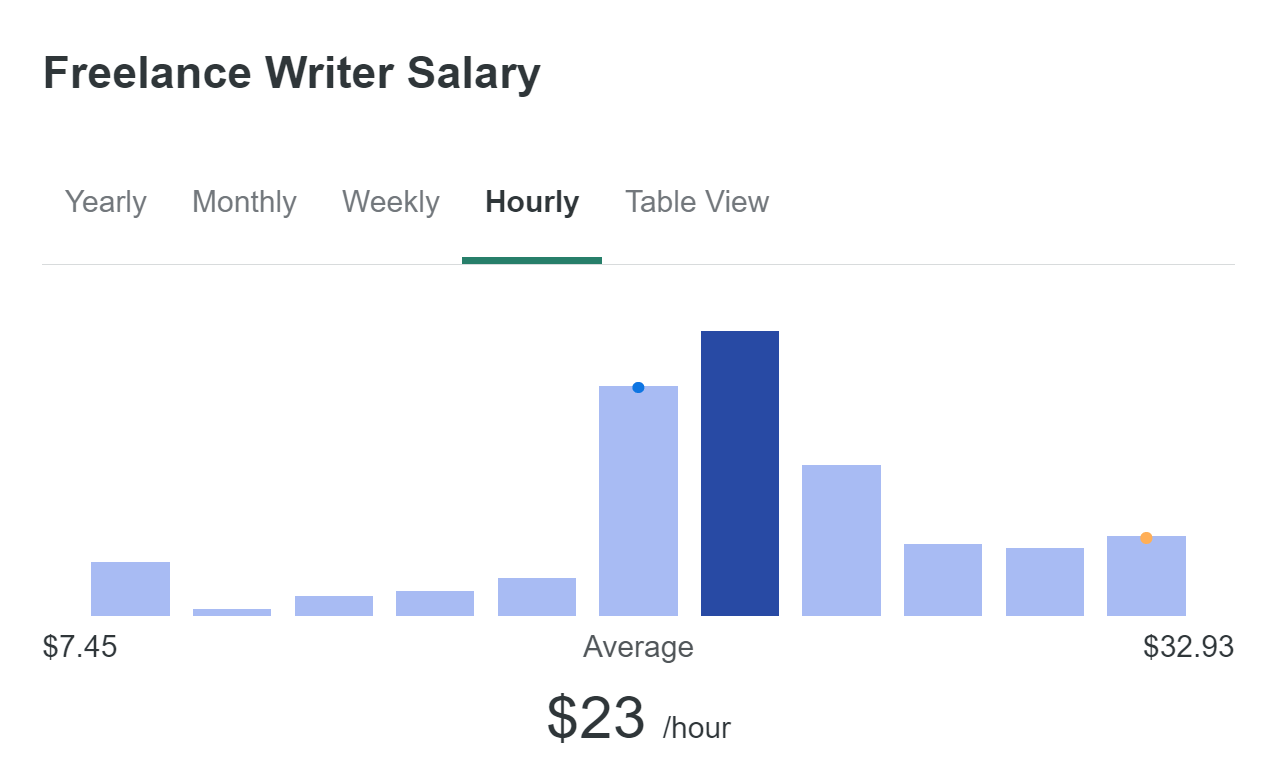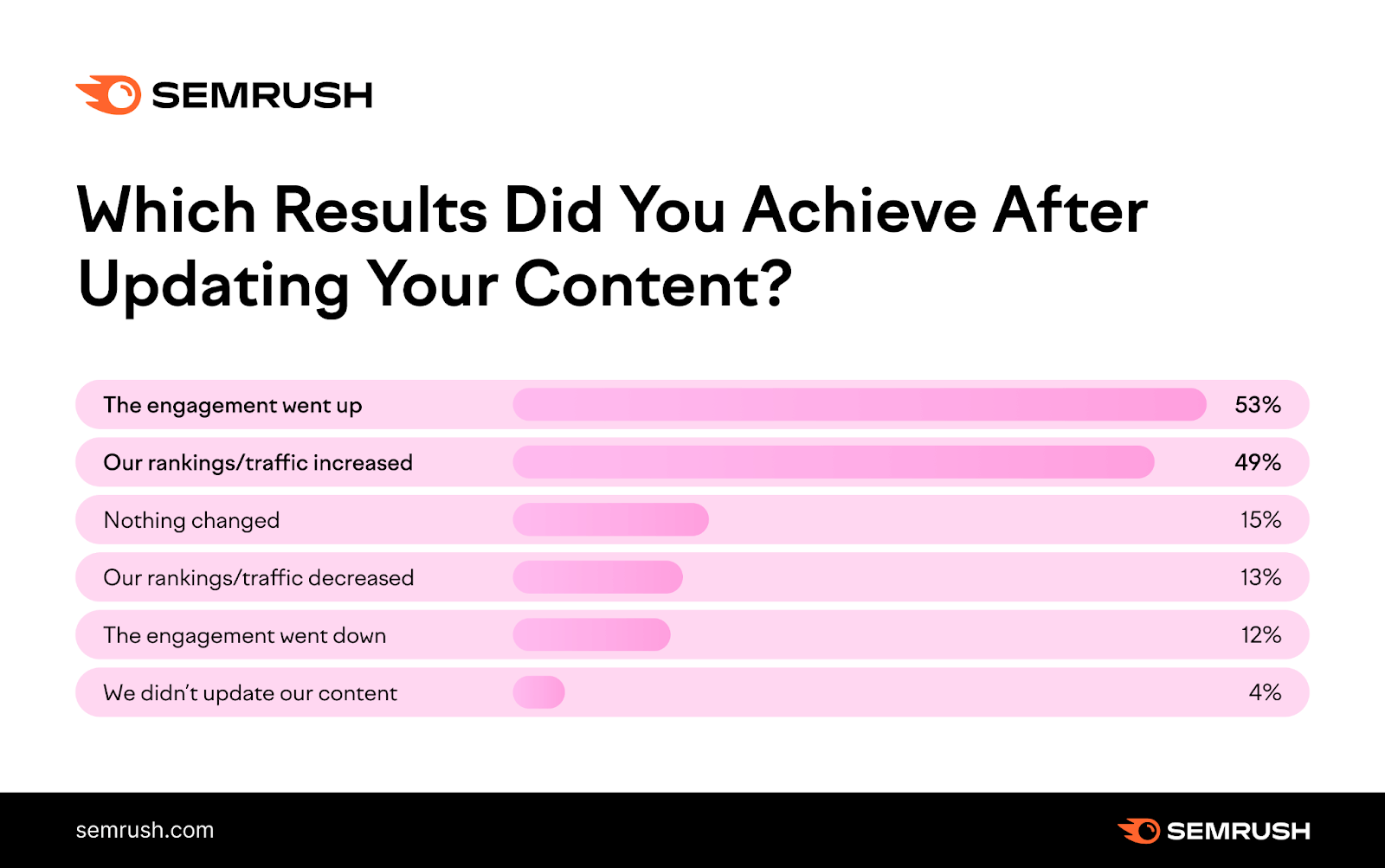Have you ever spent hours writing the perfect blog post, only to see it not get any traffic?
Frustrating, right?
What if I told you there's a way to breathe new life into your existing content and reach even more people with the same great ideas?
That’s where content repurposing comes in.
In this blog post, we're going to dive deep into content repurposing. We're going to cover what content repurposing is, why it's a crucial strategy for your business, and most importantly, how to do it effectively.
By the end of this post, you'll have the knowledge and tools to turn your existing content into a goldmine of opportunities across multiple platforms.
Let's get started!
More...
Key Content Repurposing Statistics
What is content repurposing?

Example of what content repurposing looks like in practice.
Content repurposing is the practice of taking one piece of content and transforming it into multiple pieces of content for different platforms.
Think of content repurposing as a way to maximize the value of your hard work.
Instead of creating entirely new content from scratch each time, you're leveraging what you've already created and adapting it to fit different contexts and audience preferences. This way you can reach more people without the stress of always having to create something new.
Do you need help repurposing your content?

The Marketing Project is a digital marketing agency that specializes in Q&A marketing. So if you are interested in repurposing your videos, podcasts, and blog posts, check us out.
We turn each one of your pieces of content into blog posts, email newsletters, and social media posts.
If you are interested, visit our content repurposing service page.
Why should I repurpose content?
These days, content repurposing isn't just a nice-to-have strategy—it's becoming essential for businesses of all sizes.
But don't just take my word for it.
Let's look at some data that highlights why content repurposing should be a key part of your marketing strategy.
1. It's a widely adopted practice
According to a recent survey by Adobe Express, 70% of small business owners are already repurposing their content. This widespread adoption isn't a coincidence—it's a testament to the effectiveness of content repurposing in maximizing marketing efforts.
Over the past few years, we’ve seen digital marketing start to look a lot like it did 50 years ago. People no longer get their information from just one source—they’re gathering it from multiple places.
Some people get it from search engines like Google, Pinterest, and YouTube, while others from social media platforms like X, Instagram, and LinkedIn, and other people are getting it from Podcasts.
With that in mind, it doesn’t make sense to create content from scratch every time—which actually leads me to the next benefit.
2. It saves time and money, and boosts productivity

Adobe Express survey on the adoption of AI tools and automation in content repurposing.
One of the most significant benefits of content repurposing is its ability to save time. In fact, the same Adobe Express survey found that 56% of small business owners who use AI to repurpose content save 1-5 hours a week. That's valuable time that can be reinvested into other aspects of your business or used to create even more high-quality content.
I remember when I was working on Guardio’s Quora marketing campaign. I had to create a lot of content every week, while also focusing on performance marketing ads. What allowed me to do that was repurposing much of the content we already had for other Quora answers, videos, and blog content.
And this leads to the next benefit, which is…
3. It increases marketing effectiveness
Nearly two-thirds of small business owners using AI for content repurposing report increased marketing effectiveness and productivity.
Businesses that repurpose content save time and improve the overall impact of their marketing efforts.
Think about it—since you already have content, you probably already know what your audience is interested in and how they respond. So, repurposing content allows you to use that same information to get even more results.
This is something we do all the time to determine demand and interest, and because of this, we are able to accelerate the sales process.
4. It accelerates the sales process
![The Purchase Funnel [TMP]](https://johnimsecrets.com/wp-content/uploads/2024/10/The-Purchase-Funnel-TMP.png)
Over half of small business owners say that using AI to repurpose content drives buyers down the sales funnel faster and increases sales.
One of the biggest challenges copywriters face is crafting high-converting sales pages. If you already have landing pages that perform well, you can use them to train AI models to craft more high-performing sales pages.
This is exactly what Authority Hacker did to make six figures selling their product reviews online course.
This shows that repurposed content can be a powerful tool in nurturing leads and converting them into customers.
5. It allows you to reach different audience segments
Repurposing content for different platforms is a fantastic way to reach audience members who prefer different types of content. Some people love reading blog posts, while others prefer watching videos or listening to podcasts.
For example, according to a survey by Pew Research Center, “most U.S. adults use YouTube (eight-in-ten U.S. adults (83%) and Facebook (68%), while around half use Instagram (47%).”
This data suggests that most adults in the U.S. prefer consuming long-form videos, images, stories, and video reels. Content repurposing allows you to cater to these diverse preferences.
6. It reinforces your message
Repurposing content allows you to present your key messages in multiple formats, which can help reinforce your brand's message and improve audience retention.
7. It improves your SEO
Repurposing content across different platforms creates more opportunities for your brand to appear in search results. This can significantly boost your online visibility and drive more traffic to your website.
8. It's cost-effective
Creating high-quality content from scratch is time-consuming and often expensive. Repurposing allows you to get more value out of your existing content.
Think about it—the Adobe Express survey I shared before found that 56% of small business owners who use AI to repurpose content save 1-5 hours a week.

ZipRecruiter's data on how much freelance writers are paid in the U.S. as of October 2024.
And according to ZipRecruiter, as of Sep 30, 2024, the average hourly pay for a Freelance Writer in the United States is $23.27 an hour.
Meaning that if you use AI to repurpose content, you could save anywhere between $23.27 and $116.35 per week (per writer). Or more if you save more than 5 hours per week.
As you can see, those numbers quickly add up, making it a no-brainer for most businesses.
9. It keeps your content fresh and relevant
Repurposing gives you the opportunity to update and refresh older content, ensuring that it remains relevant and valuable to your audience.
Think about it. When you repurpose content, you need to go back and make sure everything is up to date. This is a perfect opportunity to refresh your content! Ideally, you should do this at least twice a year to maintain factual accuracy.

SEMrush's data on which results marketers saw after updating their content.
10. It leverages emerging technologies
With 1 in 6 small business owners using AI to repurpose content, it's clear that content repurposing is at the forefront of marketing innovation.
We’ve seen how disruptive AI has been in most industries, and it’s not stopping anytime soon. There are too many benefits to disregard it as a fad. So why not take advantage of these emerging technologies to get an edge and stand out?
Examples of content repurposing
Here are some common examples of content repurposing:
1. Turning YouTube videos into blog posts:
This involves transcribing your video content and reformatting it into a written article, complete with relevant headings, images, and additional context.
2. Transforming blog posts into YouTube videos:
Take the key points from your written content and create an engaging video script, adding visual elements to bring your ideas to life.
3. Creating social media posts from longer-form content:
Break down your blog posts or videos into bite-sized chunks perfect for platforms like Twitter, Instagram, or LinkedIn.
4. Developing infographics from data-heavy articles:
Take complex information from your blog posts and present it visually in an easy-to-understand infographic.
5. Turning webinar content into an email course:
Use the material from your live presentations to create a series of educational emails for your subscribers.
6. Compiling blog posts into an ebook:
Gather related blog posts, add some additional content, and package it as a comprehensive eBook or guide.
7. Creating podcast episodes from popular blog content:
Use your written content as a script for podcast episodes, adding your personal touch and expanding on key points.
My final thoughts
The beauty of content repurposing lies in its versatility. You're not just copying and pasting content from one medium to another. Instead, you're adapting and optimizing your message to suit different platforms and audience preferences.
This approach allows you to reach a wider audience, reinforce your key messages, and get more mileage out of your content creation efforts.
